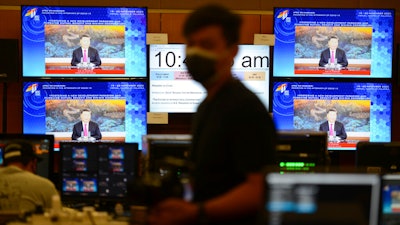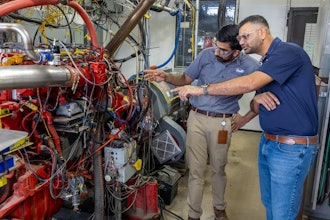
KUALA LUMPUR, Malaysia (AP) — China's President Xi Jinping on Thursday spurned suggestions that his country might decouple or separate itself from the U.S. and other trading partners amid tension with Washington and Europe over technology and security.
Speaking by video link from Beijing to a meeting of Asia-Pacific CEOs, Xi promised to open China’s market wider but announced no initiatives to respond to complaints the ruling Communist Party improperly subsidizes and shields technology and other industries from foreign competitors.
Xi rejected suggestions Beijing might respond to U.S. sanctions on its fledgling technology companies by trying to separate their industries from global trading partners.
The ruling Communist Party has promoted its own standards for mobile phones and other technology, which would encourage customers that adopt them to use Chinese suppliers. That has prompted fears world markets might split into smaller segments with incompatible industry standards, hurting productivity.
“We will never go back in history by seeking to decouple or forming a ‘small circle' to keep others out," Xi said.
Thursday's event came ahead of a meeting of Asia-Pacific Economic Cooperation leaders hosted by Malaysia. The meeting Friday is due to be conducted via video conference due to the pandemic.
Xi's comments followed Sunday's signing of the world's largest free trade agreement, the Regional Comprehensive Economic Partnership, by Beijing and 14 other Asian neighbors.
The Chinese-initiated RCEP appeals to other developing countries because it reduces barriers to trade in farm goods, manufactured goods and components, which make up most of their exports. It says little about trade in services and access for companies to operate in each other’s economies, which the United States and other developed countries want.
The Trump administration has cut off Chinese tech giant Huawei’s access to most U.S. components and technology on security grounds. Washington has shut Huawei and a rival Chinese telecom equipment vendor, ZTE, out of the U.S. market. The White House is pressing the Chinese owner of video service TikTok to sell its U.S. operation, which American officials say is a security risk.
Xi promised to cut tariffs but gave no details.
“We will further reduce tariffs and institutional costs, cultivate a number of import trade promotion innovation demonstration zones, and expand imports of high-quality products and services from various countries," he said.
China’s repeated promises to set up trade zones and ease import restrictions prompt complaints by the United States, Europe, Japan and other trading partners that Beijing is using such isolated steps to avoid complying with promises made when it joined the World Trade Organization in 2001 to allow foreign companies to compete freely in its economy.
China is one of the world’s biggest importers, but the United States and other governments complain Beijing is dragging its feet on carrying out two-decade-old promises to open its markets to foreign competitors in banking, finance and other services.
Leaders from Singapore, Malaysia and Indonesia also spoke at Thursday's event, calling for a deeper commitment to open and free trade to bolster the region's economy.
Singapore Prime Minister Lee Hsien Loong said RCEP was a “big step forward" for Asian economic integration as progress in APEC was hampered by Washington's inward-looking trade policy.
With new President-elect Joe Biden's government seen as more supportive of multilateral trade, Lee voiced hope the new U.S. government will be more constructive in its dealings with other countries.
“Taking care of America’s interests does not mean having to ride roughshod over other countries’ interests," Lee said.
Malaysian Prime Minister Muhyiddin Yassin said free and open trade and investment, regional economic integration, as well as economic and technical cooperation must remain APEC's priorities moving forward.
But he said there is now a need “to ensure a delicate balance between our health priorities and economic needs."
Indonesian President Joko Widodo defended a controversial new jobs law that he said would improve the business climate and prop up his country's economic growth.
The law approved last month revises dozens of existing regulations to cut red tape. It sparked violent protests from workers who fear it will cripple labor rights and harm the environment.
“Indonesia is using the momentum of this crisis to carry out extraordinary structural reforms....so that we can move quickly through these difficult times. We are ready to open the doors widely for businessmen and for investors in new ways," Widodo said.






















